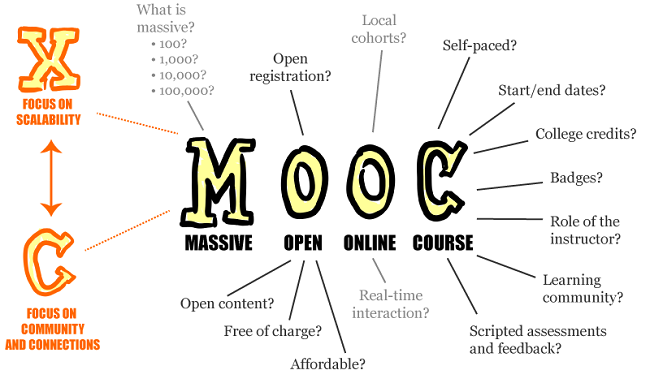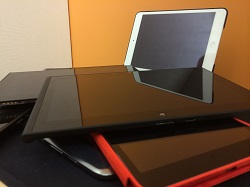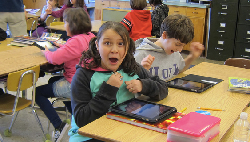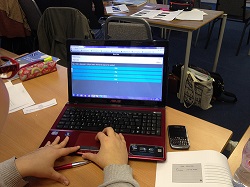Global education pioneers Promethean are heading to Bett 2016 to spread the word of collaboration. Taking into account employers’ increasing emphasis on the need for collaborative skills, the edu-resource experts will be attending the London conference to show teachers how these abilities can be developed. The Bett Show is taking place at ExCeL London from 20th - 23rd January, and Promethean will be meeting attendees at Stand B99.
Different kinds of learners require different methods of teaching. Here, Educare founder and director Keir McDonald discusses how teachers can use different e-learning programs to accommodate all pupils.

For years now, the topic of learning styles has dominated educational community forums. And while understanding the manner in which students best receive and retain information can be complex, the bottom line is that understanding how individual children learn can help educators reduce frustration and improve overall achievement.
The kids we teach in our classrooms today are undoubtedly ‘digital natives’. Born in an age of established technology, the latest generation of students have grown up with clever gadgets and devices, leading to today’s youth having an unrivalled passion and understanding for the digital world. Research suggests that three quarters of children now use the internet at home, and nearly all use it at school, with around 41 percent of 9 to 19 year olds having access to the web each and every day. At a time when the traditional textbook is being phased out in favour of technology, it’s time for teachers to adapt their methods of delivering information to meet the contemporary needs of children growing up in the digital age.
If you’re a teacher working in the UK, there’s a good chance that you use a tablet as part of your work. While we originally set out to publish an article on the different tablet devices available to educators, the response to our questions was so Apple-oriented, we’ll begin with iPads for now.

This article is comprised of the opinions of ten different education professionals, either teachers or former teachers. Twitter profiles are linked to the first use of a contributor’s name.
MOOCs continue to spread throughout the world. But how will they affect e-learning in the UK? TechnoTeacher Nicole Ponsford takes a look.

MOOC = Massive Open Online Course. You may have now heard of them as the BBC has published an article about the UK’s Future Learning, illustrating their global demand. I have just completed my first of these courses, and believe MOOCs will change of the tone of learning for us all.
After Bett last month, many in the education industry are considering the current state of technology in the classroom. There’s a wide range of gadgets that teachers can consider, and Matt Britland gives his thoughts on the options available.

Last year I wrote an article for the Guardian on the future of technology in education. This article focused on ‘The Cloud’ and its impact on education, whilst only briefly mentioning devices. As it’s now 2014, I thought it would be useful to revisit this subject and take a look at some things to look out for and how they can be used to support teaching and learning over the coming years.
Schools are taking tablets very seriously at the moment, and many are investing in new devices. Apple has a bit of a stranglehold in education with its iPad, but with an influx of cheaper tablets more and more schools may opt for Android devices like the Tesco Hudl. Microsoft are trying to get involved with its new Surface 2, so 2014 or 2015 may see Apple losing its grip. The iPad is my preferred device, but it is expensive and schools need to decide how tablets will be used to support teaching and learning before they splash out. From a personal point of view, Apple need to make some improvements in order to keep ahead. Not all schools want to go 1:1, and there needs to be far better ways to manage devices used across the school. Multiple profiles on devices would be fantastic, as would true multitasking with apps working side-by-side; some operating systems are already offering this. Apple and other providers need to start talking to schools if they want us to invest money in their devices. Tablets are not always suitable for certain needs, Google Chromebooks are making headway in schools as many are looking at adopting Google Apps, which is free for education use.
As a teacher of Modern Foreign Languages at Surbiton High School, Kingston Upon Thames, Assistant Principal José Picardo is an important part of the teaching community. As head of Digital Strategy at the school, he’s very keen to make sure that technology is implemented correctly in the classroom. He gives his thoughts on the latest Network.Ed piece.

Last September I started a new role as Assistant Principal at Surbiton High School. My brief is the school’s digital strategy. Now, I’m not the first to be appointed to lead a school’s digital strategy – there have been Directors of E-Learning or Directors of ICT elsewhere for some years, but I am one of the first to be appointed directly to the Senior Leadership Team with the specific purpose of devising and implementing a digital strategy to support teaching and learning. And I won’t be the last. Here’s why…
Research shows that lessons are most effective when they are structured thus:
 Poetry is one of the arts that many students struggle with. I always found that providing an initial successful learning experience was the best way to instil both confidence and foster engagement with my students.
Poetry is one of the arts that many students struggle with. I always found that providing an initial successful learning experience was the best way to instil both confidence and foster engagement with my students.
Here are a bunch of apps that would allow a student to get their teeth into writing some poetry and for those that struggle, an opportunity to see just what they are capable of.
Photo credit: JJPacres
Many of you will be looking to integrate more technology in your classroom this new academic year, but unsure at what software and apps to actually go for. Here is a list of Mark Anderson's top free edtech tools for assessment, recording and sharing video and audio, creating posters and presenting learning.

E-learning or using technology to support learning comes in many different shapes and sizes.
I’m always being asked to give advice and ideas on different online tools or iPad apps that can help with learning in the classroom. It’s always a challenge to balance the needs of the activity, with the skills of the learners and often too the greater challenge is to raise the confidence of the teachers.
I often hear from teachers about how they want to achieve more effective learning using technology, but often don’t have the software resources to achieve them, which is often due to finances. This article aims to give you my top free online tools to support learning in the classroom.
Photo credit: Danny Nicholson

Curation has always been an important weapon in the arsenal of a student, but never before has it been easier to curate, gather, organise and collate information on topics. It is going to change the way in which we teach, and the way in which students learn and can access information.
Robin Good is bang on in his detailed article on the topic when he gives his ten reasons why curation is transforming the education landscape:

A community-driven platform for showcasing the latest innovations and voices in schools
Pioneer House
North Road
Ellesmere Port
CH65 1AD
United Kingdom